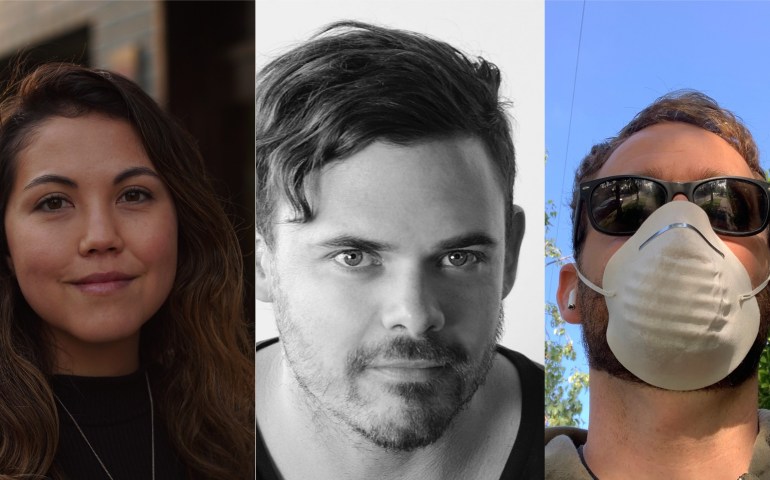Natalie Erika James, Ben Young and Zak Hilditch.
Australian directors working on productions in the US get far more time, money and resources than they were accustomed to at home.
But there’s a downside: Loss of creative freedom.
“I liken working in the American studio system to working on a two-hour television commercial where you have a lot of different voices telling you that you are not allowed to do things the way you want to,” says Ben Young, who directed Extinction for Netflix and was co-directing Clickbait for the streamer when production was shut down.
“In making an American film you have way less freedom but way more support. The level of support and resources you get in the US is amazing but I miss the control I had in Australia.
“What I’m desperately searching for is that middle ground where I can have the toys and the freedom to do what I want with them.”
Conversely Zak Hilditch, who followed his debut film These Final Hours with 1922, an adaptation of the Stephen King novella, and crime drama Rattlesnake, both for Netflix, found dealing with Netflix a far quicker process than dealing with government agencies.
“We had to jump through a lot of hoops and rightly so to get These Final Hours financed. With 1922 it took one coffee at Netflix with my producer Ross Dinerstein and Netflix’s Ian Bricke. The next day we were greenlit,” he says.
Young, Hilditch and Natalie Erika James discussed their craft in Escaping the Real World: Genre and Horror Film, an Australians in Film webinar last week moderated by The Other Lamb screenwriter Catherine S. McMullen.
IFC Midnight will release James’ debut feature Relic, a psychological horror movie co-scripted by James and Christian White, featuring Emily Mortimer, Robyn Nevin and Bella Heathcote, in cinemas and on VOD in the US on July 10.
James recalled getting three notes from Screen Australia on her late-stage cut of Relic, compared with six pages of notes from the US co-producers, Nine Stories Productions’ Jake Gyllenhaal and Riva Marker, but found that was a very collaborative process.
Hilditch was surprised to discover the concept of a script editor was entirely foreign to the Americans he’s dealt with.
Asked when they developed their passion for genre films, Hilditch pointed to watching horror videos such as John Landis’ An American Werewolf in London when he was a kid.
James loved reading Gothic literature and dark fairy tales as a kid, which progressed to making supernatural and horror films when she studied at the Victorian College of the Arts.
Growing up, Young loved 1990s thrillers like The Silence of the Lambs but regarded his debut film Hounds of Love as a psychological drama until he kept being told it was a horror movie.
“I would jump at the chance to make something like H is For Happiness or Love Actually because those movies make me feel something,” Ben said.
“Rather than genre, I look towards stories that have an emotional resonance, and fear is an emotion.”
Young tells IF he is co-writing with Victor Gentile The Future is Us, a thriller which follows a colony of people who are living on the moon after the Earth was wiped out and how they long to reconnect with their human history. Gentile co-wrote the feature doc Whiteley with writer- director James Bogle.
Before COVID-19 changed the world Zac was planning to shoot Airborne (formerly Celestial Blue), a prescient thriller about a mid-flight pandemic, in Bulgaria, produced by Dinerstein and Liz Kearney, backed by XYZ Film.
Now he says: “I’ve had to rewrite the entire film because the fantastical virus that happens on that flight is nothing compared to what has actually happened.”
James and White are collaborating on Drum Wave, a folk horror feature inspired by their eponymous 2017 short film which was funded by Screen Australia’s Hot Shots program.


